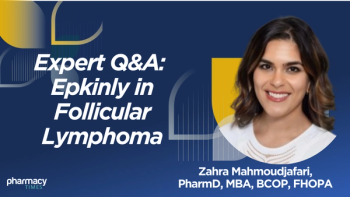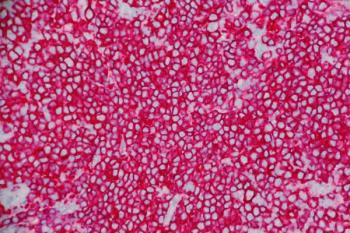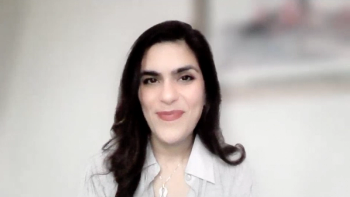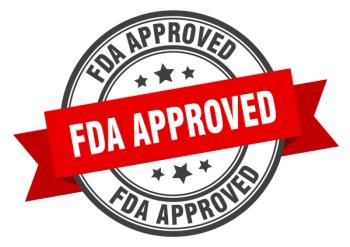
IRIS Trial Highlighting Role of Imatinib in CML Treatment
Experts review the optimal imatinib dosing strategy that is recommended for patients with chronic myeloid leukemia based on the dosing from the IRIS trial.
Episodes in this series

Neal Dave, PharmD: Imatinib isthe big drug that was approved and was exciting in oncology over 20 years ago. It changed the course of the disease. A lot of providers use that as the baseline, so we can start from there because it’s been out for so long. It’s generic, so the cost of the drug is much less. It’s relatively inexpensive, considering the cost of branded drugs. In terms of overall survival, the response is similar to the other second-generation TKIs [tyrosine kinase inhibitors]. All those factors play into starting with imatinib over the others.
You want to have a quick response. At 3-, 6-, and 12-month intervals, you want to ensure you’re having an adequate response. If at any time you’re not progressing on therapy or your response isn’t progressing, you’re not having an adequate response. That’s when you look at a different TKI or another therapy.
The optimal dosage of imatinib in the original IRIS trial was 400 mg daily. There was a dose escalation cohort that escalated up to 800 mg. That’s a possibility: using imatinib at a higher dose than the starting dose of 400 mg. Patients may or may not see a benefit from using a higher dose. You’re risking higher toxicities and more adverse effects if you escalate up to 600 or 800 mg. There’s some risk with that. You may not get the same benefit or as long-lasting of a response compared with some other TKIs.
Resistance to medication could be due to the medication itself, the disease, or the mutation of the disease of the BCR-ABL gene, or it could be due to compliance. It makes sense. If you’ve had a response to the initial starting dose, then maybe look at dose escalation but keep the patient on the same dose, as long as they’re not having any other toxicities. That’s 1 reason to continue to dose escalate. If you haven’t had a response at any of the intervals, then it makes sense not to increase the dose because you’re most likely not going to get another response.
Brandon Dyson, PharmD, BCOP, BCPS: What’s the optimal imatinib dosing strategy recommended for chronic phase CML [chronic myeloid leukemia] based on the IRIS trial, and when is it appropriate, if ever, to dose escalate imatinib based on the results of the IRIS trial? The IRIS trial is the original study that put imatinib and TKIs out there and steered us to where we are right now with CML. It looked at imatinib vs interferon plus cytarabine, which is what we used to do for CML. Spoiler alert: imatinib won by a lot—it blew it away. That has completely directed how we treat CML from that point going forward.
A subset of that trial looked at the appropriate dose of imatinib. There were 106 patients, and most patients started taking imatinib 400 mg once a day. But some patients did not meet their milestones, which were directly laid out in the protocol. Did they have a complete hematologic response in 3 months, for example? There are a few things they were looking at. For patients who were behind schedule, they were allowed a dose escalation of 600 mg—and up to 800 mg—of imatinib to see if we could get them under control. It was fairly effective: 86% of patients got dose escalated. These were already patients who were not making their milestones, and up to 86% of patients, who were escalated to a 600- or 800-mg dose, obtained some semblance of control and got their counts back down.
The problem is that there are adverse effects from imatinib. Across the board, you’d see grade 3 bleeding, headache, myalgia—a few things that all were significantly higher in the arms that dose escalated. Although we got to see that a higher dose of imatinib can get past some of the potential resistance mechanisms and some of the ability for the CML to outpace imatinib, a higher dose can help mitigate some of that and keep patients on schedule, in terms of their milestones. The tolerability made it difficult. In practice, you don’t see that much dose escalation. Part of that is because we have so many good second-generation agents, so we have more things to fall back on. This was more appropriate 10 years ago when we had fewer options available. But there’s still a subset of patients for whom it may still make sense to dose escalate.
For example, imatinib is the only TKI that has a generic, and cost can be a tremendous driver in the world of oncology. If a patient has patient financial assistance, or their insurance makes certain second-generation drugs not a good candidate, then dose escalating imatinib might be reasonable. But it also depends on the genetic analysis. A lot of times—it’s not 100% done—when patients aren’t making their milestones, we might see if there’s any mutational resistance going on. Depending on the results of that, imatinib may not be a candidate, period. It depends.
There are 2 main kinds of resistance that we see with imatinib. One is the binding site changes, where imatinib will not work anymore. The second is seeing more the BCR-ABL gene, which is outproducing imatinib. Higher doses will account for outproducing. If you have more imatinib, then you can take care of more BCR-ABL positive cells. But if it’s a mutation or a binding site alteration, then imatinib can no longer bind to BCR-ABL, it won’t work any further. I don’t see it as much with those escalations because we have many good second-generation agents, but it’s still a potential strategy for the right person.
Transcript edited for clarity.
Newsletter
Stay informed on drug updates, treatment guidelines, and pharmacy practice trends—subscribe to Pharmacy Times for weekly clinical insights.




























